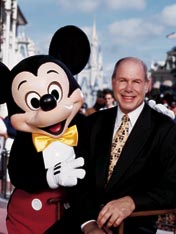 After 21 years at the helm, Michael Eisner will step down as chief executive of The Walt Disney Company today. Reports from around the web look at his legacy:
After 21 years at the helm, Michael Eisner will step down as chief executive of The Walt Disney Company today. Reports from around the web look at his legacy:
“Just days before exiting his post as CEO of the Walt Disney Co., Michael Eisner… called his 21 years at Disney “the most gratifying experience in my life. The culture of the company, the ethic, the assets, the enthusiasm were there when I arrived in 1984, and I’m proud as I leave to see that they are still there” (The Hollywood Reporter).
“Unfortunately for Eisner, he is more likely to be remembered for the missteps and controversies of the last decade than for the phenomenal successes of his first 10 years, when Disney blossomed into a media powerhouse. That’s the way Hollywood operates, after all – you’re only as good as your last screenplay” (LA Times).
“In two decades he transformed a struggling animation studio and its pair of amusement parks into a global entertainment powerhouse with 11 theme parks, a dozen television channels, a top-rated broadcast network, one of Hollywood’s biggest film studios… In fact, Michael Eisner’s record at Disney will be hard to beat says Laura Martin, an analyst with Soleil-Media Metrics: ‘That is a feat almost unprecedented in corporate America over a 20-year period'” (MSNBC).
“Eisner didn’t do it alone. He was part of a Hollywood Dream Team. There was former Warner Bros. President Frank Wells, a craggy, sometimes absent-minded lawyer who could doze off during a lengthy discussion but was the glue that held the Mouse House together. Studio chief Jeffrey Katzenberg helped Eisner resurrect the company’s animation unit with the tirelessness of a man who slept only five hours a night and famously told employees that ‘if you don’t want to work Saturdays, don’t bother coming in on Sunday.’ Gary Wilson came from Marriott and brilliantly financed Disney’s film and theme-park expansion. (Business Week).
“However, the emperor’s choke hold on this magic kingdom had begun to squeeze the life out of the company. From the huge loss of Jeffrey Katzenberg years ago, to the recent split with movie moguls Bob and Harvey Weinstein, Eisner was increasingly perceived as doing more harm than good. Investors, insiders and the board grew restless” (MSN).
“Mr. Eisner’s recent years… were marred by the shareholder revolt and a bitter board fight in which Mr. Eisner clashed with two former directors – Roy E. Disney, the nephew of the founder, and Stanley P. Gold, Mr. Disney’s financial adviser. They had originally lobbied to give him the top job in 1984 during another management shake-up. More recently, they sought to oust him, contending his clashes with employees and Disney’s partners were a drag on the company” (NY Times).
“But industry experts say that ironically, as Eisner says farewell as Disney’s chief executive officer, the company has begun to return to the double-digit earnings growth that marked his first decade running Disney” (Washington Post).


